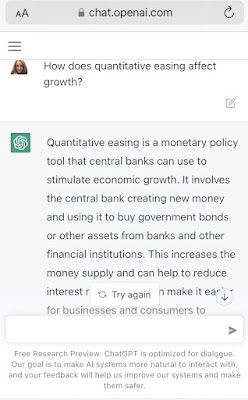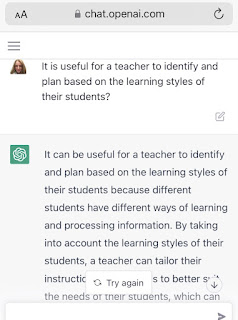After registering on the ChatGPT website you are taken to a browser page. You can type in any question you like, and you will be provided with an answer. That’s what ChatGPT offers. It is a ‘chatbot’ and it is currently operating in a free ‘research phrase’ to collect feedback from users.
Great, isn’t that what Google does?
ChatGPT is not a search engine - it is text only and it won’t pull information from elsewhere on the internet. It will give you answers using only the large body of content which it has been fed, so it does not know ‘everything’ and cannot address questions about current or future events. It does converse in a more ‘human’ manner than Google though, it’s maybe best thought of as a quiet, somewhat bookish, Alexa.
Why should I care?
- Home Study
The content provided by ChatGPT appears to be of a much higher quality and far more specific than students could typically obtain from the internet via search engines. Users can obtain everything from composition of unique poetry and creation of full bespoke essays to detailed factual accounts and definitions. All provided in seconds.
You have to try it to believe it. I questioned it on how quantitative easing affects economic growth, the contestability of the car market, facts about F. Hayek and A. Smith, and numerous other topics. I rapidly received high quality and detailed responses.
I managed to obtain a reasonable essay on the private and external costs of building a power station, and paragraphs of analysis and evaluation on fiscal and monetary policies. I was also able to obtain answers to definition and calculation questions, such as calculation of elasticity and definition of GCSE business key terms.
Educators need to be aware of the possibility that their students are having ChatGPT do their homework for them, and the considerable difficulty they will face in spotting this!
- Resource Creation, Access and Cost
I was astounded to discover (thanks to Sam Barker) that ChatGPT can almost instantly create sets of questions and answers. This is a game changer in terms of creation and provision of practice and retrieval resources for students. Within seconds I was able to create short tests on topics such as Jane Eyre, the Blitz, price elasticity of demand calculation, and V-shaped/U-shaped valleys. The disruptor potential of software such as this for the teaching resource market is huge. Why would I buy question sets, when I can create then in seconds? Barriers such as cost and time that may have prevented me offering plenty of practice suddenly seem to melt away with the prospect of instant questions and answers on tap.
I was also rapidly able to access useful factual content such as details about the Winter of Discontent and causes of the Eurozone crisis. The increased speed and quality of access to information potentially could begin to threaten markets such as the textbook market - with budget and cost of living pressures, do you have students rely on this kind of free, instant online support instead of a sole, expensive textbook?
3. Critical Consumers Curriculum
Hopefully you are already educating your students on the importance of being critical consumers of information. Yet this kind of software raises the bar of critical standards that need to be applied.
The information provided by ChatGPT appears to be credible and factually correct to the novice user, and only subject experts might be able to identify flaws or omissions in answers given. For example, I posed a question about the largest economy in the world. This was deliberately designed to discover whether the bot would inform me that it was the USA (it did), using GDP converted using market exchange rates. Only an expert in the field would know to question the methodology though and delve into the conversion using a purchasing power parity exchange rate, which actually generates a different answer of China being the largest when this method is used. I challenged the bot and it responded that the method it chose was the ‘most commonly used’. This may well be true, but it doesn’t mean it the the ‘best’ or ‘only’ method.
Therefore, we must educate students in exercising caution around accepting a sole answer given as being the only possible answer or the whole story. Knowledge in many areas is often not as objective as it may seem, and use of any source needs a cautious approach and a critical eye. Multiple sources and perspectives are important in efforts to uncover truth across many subjects and even the notion of a single truth should be contested. This has to be a key part of our curriculum.
4. Job Security
Many will continue to scoff at AI replacing the jobs of teachers, but there are increasingly noticeable hints of the potential of software like this to reduce the labour force needed to deliver education. Whether this manifests in the reduction in time needed to create resources and find content creating efficiency savings, or in an increased reliance on non-specialists/less qualified staff due to the increased provision of information online, there are potential labour market implications that could arise from this type of software.
This, of course, is not the only example of AI in the educational world, and many companies are currently working to develop software that delivers content, assesses students, learns about their performance and tailors future content accordingly. The increased uptake of online schooling post-pandemic combined with developments in this kind of technology could continue to change certain parts of the sector significantly, especially outside of the mainstream.
Caveats?
These are early days. ChatGPT continues to reveal various errors and omissions as I use it. It’s not quite there yet. In questioning it on price elasticity of demand it demonstrated a major flaw (thanks to Michael Hill for spotting that!), it failed to provided any counter points or evaluation in some of the essays I requested (just knowledge, application and analysis), and it was a little off the mark in some technical topics (such as business objectives and application of wage elasticity). It also failed the CPD acid test…!!
So, you would probably spot some ‘tells’ in a student homework that came directly ‘copied and pasted’ from the bot. And you do most certainly have to know what you’re talking about to ensure test question sets and content extracted are correct and usable in teaching, or professional development!
But this type of software is likely to improve considerably over time. So, whilst it’s not necessarily the full package as yet, now is the time to start thinking about potential impacts on the sector and our own practices in order to stay ahead of the curve.






Comments
Post a Comment